Thursday Feb 19, 2026
Thursday Feb 19, 2026
Thursday, 25 July 2024 03:52 - - {{hitsCtrl.values.hits}}
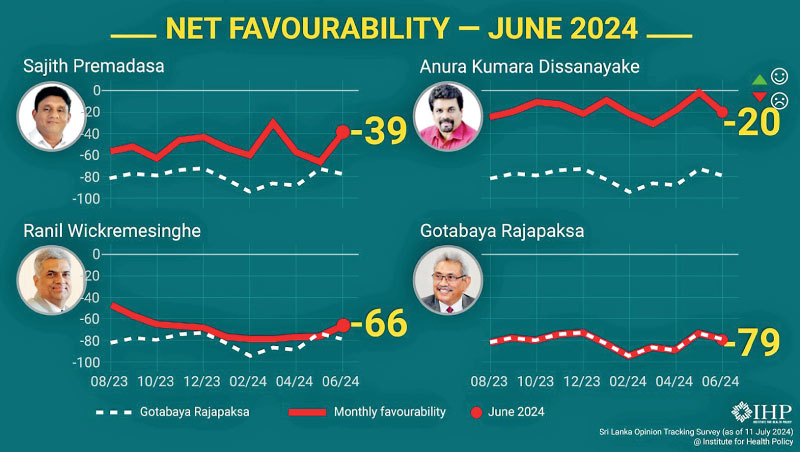
AKD ahead, dipping; Sajith runner-up, rising
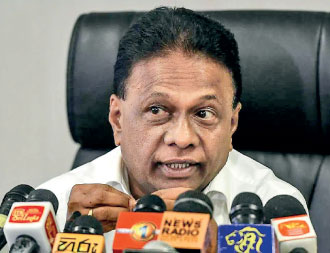
Dullas: NPP’s blunder
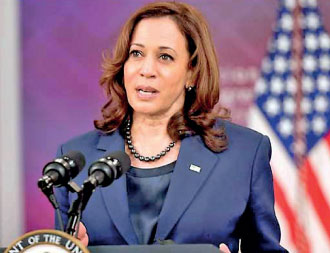
Inspiration for women and girls, globally
“…key growth drivers along with greater integration with giant and prospering neighbour India. With regard to the latter, he [Wickremesinghe] singled out land connectivity between Sri Lanka and burgeoning South India as a critical development.”
 Whatever the outcome, a Kamala Harris presidential run will have a powerful positive impact on the consciousness of Asian (especially South Asian) women and girls, and on women and girls of colour throughout the world, thereby acting as a progressive factor in history.
Whatever the outcome, a Kamala Harris presidential run will have a powerful positive impact on the consciousness of Asian (especially South Asian) women and girls, and on women and girls of colour throughout the world, thereby acting as a progressive factor in history.
I hope Vice-President Harris picks Senator Bernie Sanders as her running-mate because Republican JD Vance is a formidable aspirant Veep with a compelling story. The US Democratic party establishment will probably block Bernie, though he is faring very well in public opinion polls.
Even if Donald Trump wins, all is not lost. One term of an awful MAGA (‘Make America Great Again’) agenda and the US will be ready for something I hope to see in my lifetime: an Alexandria Ocasio-Cortez (AOC) Presidency. Her opponent will probably be Vance.
Meanwhile back at the ranch (or paddy field), Basil and Mahinda Rajapaksa are paying the price for the unprincipled folly of picking their traditional foe Ranil Wickremesinghe over their own able ideologue-turned-dissident Dullas Alahapperuma as successor President in the parliamentary vote. Ranil is now openly destroying their party, annexing a chunk and carrying-off its young barons and warlords.
South India Syndrome
The constitutional amendment we really need is one that prohibits and punishes what President Wickremesinghe seeks to do.
A vote for Ranil Wickremesinghe is a vote for a land bridge to South India, specifically Tamil Nadu. He first presented the idea as Prime Minister in 2001. He reiterated it in July 2024, just last week, at the Human Capital Summit with over 600 attendees including 60 global and local experts, and former Australian Prime Minister Scott Morrison as Guest of Honour.
“President Wickremesinghe…also underscored the importance of integrating power and land connectivity in a strategic move to enhance Sri Lanka’s economic growth. Speaking on the subject, the President stated that while power connectivity is vital, land connectivity stands as the most crucial sector for development. He highlighted how the Tamil Nadu economy, which competes with Maharashtra and Gujarat, along with Andhra Pradesh and Telangana, could significantly benefit from accessing Sri Lanka’s ports in Trincomalee and Colombo. This integration, according to the President, would benefit both countries.”
(https://www.dailymirror.lk/breaking-news/Plans-afoot-to-position-Sri-Lanka-as-regional-hub-for-human-capital-development-President/108-287622)
Meanwhile the Sunday papers reported that ‘Milinda Moragoda presented a copy of the Pathfinder Foundation Study Group Report on India-Sri Lanka Physical Connectivity to former Australian Prime Minister Scott Morrison in Colombo last week.’
Morrison was a pronouncedly anti-Chinese leader whose Sinophobia has been corrected by his successor, Labour PM Anthony Albanese.
Connectivity with South India has been Ranil’s Big Idea for a quarter-century despite repeated popular rejection of his presidential ambitions (1999, 2005). By his own re-telling, the idea is central to his economic vision. If Ranil is given half a chance he will push forward with its implementation, mightily assisted by Prime Minister Modi and Indian monopoly capital.
The integrationist land connectivity with India project is deadly to Sri Lanka’s National Interest for five reasons.
I.The dangerous asymmetries of physical, material, geographic integration with gargantuan India.
II. Demographic, strategic and security connotations of physical, material integration with South India and Tamil Nadu (as Wickremesinghe himself specifies).
III. Geostrategic integration with India will make Delhi’s strategic planners draw up a scenario of negative ‘reverse’ power-projection by rivals through Sri Lanka; a threat it could seek to preempt or protect itself from, by annexation of the neighbouring Lankan province which the bridge connects to.
IV. A bridge to India will reclassify Sri Lanka in the eyes of China’s strategic planners. ‘Integration’ including physical connectivity with India will ‘integrate’ Sri Lanka with India on any map of potential targets.
V. Sri Lanka will feature on any military map as part of the territory of one of the competing Big Powers or Great Powers in Asia and the world. Sri Lanka will not just be integrated with, i.e., physically part of India in the ‘India vs. China’ competition, but part of the ‘US plus India (and the rest of the Quad) vs. China’ global contest.
Is that who, where and what we really want to be or perceived to be? If not, we mustn’t spare a vote for Ranil who espouses physical connectivity with South India because that would signal that we as Sri Lankan citizens don’t give a damn if this island loses its distinctive separate identity and destiny and becomes part of Tamil Nadu.
When a huge country builds a bridge which connects a small neighbour to itself without the express permission of that country, it is usually termed annexationism or expansionism. When a leader who is not elected by the people, decides to build a bridge linking his small island to a gigantic neighbour without a referendum seeking the approval of the people, then he/she is gifting his country – sacrificing it--to his large neighbour; betraying it into geopolitical slavery.
Election 2024 should be a referendum on Wickremesinghe’s idea of land connectivity with Tamil Nadu, India, and the rejection should be so total and absolute that no politician for millennia will dare attempt so treacherous a project.
This leaves a question mark against the SJB too, because its shadow Finance Minister Dr. Harsha de Silva has given repeated public expression to his ‘integration with South India’ fetish. However, unless and until I see such ‘national nihilism’ included in Sajith Premadasa’s policy platform/manifesto for his presidential run, I shall give the candidate the benefit of the doubt.
Harsha’s Tamil Nadu dependency syndrome can be countervailed by voters who can impose a ‘French outcome’ of a Left majority at a Parliamentary election.
Conservative or Progressive?
If you are a political, social and economic conservative, you will vote for the ultimate Establishment figure, Ranil Wickremesinghe.
If you are a progressive, you applauded the Aragalaya and will vote for Anura Dissanayake, Sajith Premadasa or the FSP and prefer change to the status quo. You will want to see an end to the rule of the Old Guard. You will wish to witness and assist in generational change, a greater alleviation of poverty and a greater measure of social justice and fair-play.
If you are a conservative you will not want to turn the page.
AKD-Sajith: Competing progressivisms
My focus on Anura and Sajith as the main electoral protagonists, and my addition of the ex-JVP ‘Frontliners’ as a key variable, is not a trendy pre-election or post-Aragalaya affectation. I had noted in print the importance of these three forces even when they were in embryo, as far back as 2011, i.e., 13 years ago, before the NPP, SJB and FSP were born.
“The JVP contains perhaps the smartest, most media-genic group of younger politicians and parliamentarians in the country: Tilvin Silva, Anura Kumara Dissanayake, Vijitha Herath, Bimal Ratnayake, Sunil Handunetti, and Lal Kantha.
The UNP’s Sajith Premadasa, Sujeeva Senasinghe, Dayasiri Jayasekara and Buddhika Pathirana form a similarly able cohort in the mainstream democratic Opposition…
… the JVP’s dissidents have in their ranks the most dedicated and ideologically committed cadres... [Their] de-facto leader, Kumara Gunaratnam, whose older brother Ranjithan (said to be dead) was one of the most intelligent, able and disciplined cadres I have met anywhere…”
(JVP split: can the left get it right? (Part 1) | Sri Lanka Guardian)
Talented NPP ideologue and Open University academic Ramindu Perera holds that the defining issue at this election is between ‘logics’ of ‘stability’ and ‘change’, with the NPP alone representing ‘the logic of change’. (https://groundviews.org/2024/07/22/the-post-aragalaya-political-trajectory/)
His analysis is flawed twice over. Firstly, an NPP ‘post-Aragalaya political trajectory’ hostile to Wasantha Mudalige is an anomaly. Secondly and more importantly, the reality is that both Anura and Sajith represent change. Each represents a different degree and kind of change from the other, but each type of change is well-established in world politics and political theory.
Broadly speaking, Anura represents discontinuous change, while Sajith represents change with continuity.
The JVP-NPP is repeating the JVP’s disastrous error of 1988-89. It utterly misperceived candidate Ranasinghe Premadasa as representing, possibly as a reluctant captive, the status quo of JR Jayewardene and the UNP-IPKF axis, and stability of that equation rather than change. It transpired that Premadasa represented progressive and patriotic change which blindsided the JVP. Today the NPP thinks that Sajith essentially represents Ranil’s economic status quo and its stability.
Both Anura and Sajith represent progressive change, albeit of different variants. Anura represents macro-change, ‘big picture’ transformation. He has a vision; a Big Idea. It isn’t one of socialism but of modernising national development which looks and leans outward while balancing the external and internal.
Making nonsense of SJB’s sneers, AKD fared well in Tokyo, meeting Japan’s state minister for Foreign Affairs. (https://youtu.be/OKLauQEK1jA)
Any global typology would classify Sajith as a progressive-centrist reformist. He represents more moderate, tangible change on a human-scale; capillary or molecular transformation. His praxis is incremental change in the circumstances and prospects of units of people (e.g. communities, schools, hospitals), through levelling-up reforms.
Anura’s vision of accelerated modernisation is both top-down and bottom-up. Sajith’s strategic vision falls under the category of “the Long March through the institutions”.
Anura thinks nationally, Sajith acts locally. Anura offers hope of a total national change. Sajith offers evidence of local change.
Anura’s strength is discourse; the discourse of transformation. Sajith’s strength is practice: the personal touch of transformation. It gives credibility to his claims as change-agent, and brilliantly articulated new pledge to eliminate child poverty. (https://youtu.be/jaqryJdMpnA?si=EwbiomS_NPdcfFAm)
UK Labour leader Keir Starmer’s call for a change “from the politics of performance to the politics of public service”, resonated with voters. By that criterion, Sajith may have the edge, as did his father in 1988.
The latest IHP polling shows Anura Dissanayake as the least unpopular politician, followed by Sajith Premadasa (SP). Ranil Wickremesinghe is the most unpopular next to Gotabaya, gold standard of public revulsion.
Though Anura is the least unpopular, his rating has dropped by a drastic 18% in a month. While Sajith Premadasa is second to Anura in popularity, his rating has increased by a dramatic 27%.
“In the Institute for Health Policy (IHP) SLOTS polling in June, net favourability rating of SJB leader Sajith Premadasa improved to -39 in June (up 27 points) compared to the previous month. NPP/JVP leader A.K. Dissanayake remained the least unpopular major party leader, with his favourability at -20 (down 18 points) and President Ranil Wickremesinghe’s favourability improved from -76 to -66.” (https://groundviews.org/2024/07/18/a-k-dissanayake-continues-to-lead-in-favourability-ratings/)
Anura is ahead in percentage terms, but his is a down arrow in terms of trends/dynamics. Sajith is second to Anura in popularity but in terms of trends/dynamics, his is an upward surge. Will Anura reverse his downward trend and restore upward movement? Will Sajith accelerate his upward trend to the point of surpassing Anura?
As for Ranil as possible winner, my verdict is the Brooklyn one-liner turned one-word that Johnny Depp kept practicing in Donnie Brasco: “fuhgeddaboudit!”
Dropping Dullas: NPP’s blunder
In The Communist Manifesto, Marx and Engels predicted that as the systemic crisis deepens and the revolution gets closer, enlightened sections of the bourgeois establishment would break-off and come over to the side of the people.
The JVP-NPP would have shut the door to them on the grounds that they had once belonged to the enemy camp.
AKD-NPP forfeited a chance of gaining an edge while denying SP-SJB a valuable ally. I was on President Premadasa’s team when Dullas Alahapperuma, an engagingly intelligent, radical young Editor-columnist took the existential risk (together with Sunil Madhava Prematilleke) of giving a crushed, vulnerable JVP struggling to be re-born, a vehicle and voice through new tabloids in the early 1990s.
The JVP owes Dullas big time, but in the face of the NPP’s sectarian myopia—JVP veteran and negotiator Lal Kantha wasn’t the villain -- decided against seizing the chance and warmly welcoming and incorporating the Dullas-Charitha faction. Playing JVP leaders in movies has greater value and confers higher status than risking one’s life helping the post-Wijeweera JVP survive and revive after near-extermination.
Dullas and Charitha belonged to administrations (Chandrika, Mahinda) with which the JVP had allied itself or cooperated. The impressive military veterans’ and retired Police officers’ formations of the NPP contain many who fought lethally, some cruelly, against the JVP. If so, why the lukewarm procrastination culminating in rejection of Dullas-Charitha who could have won over a crucial slice of the ex-SLFP-SLPP vote? What does it reveal?
In a Presidential election where every vote (including preferences) counts, the NPP’s populist purism or political puritanism is worse than wrong: it is folly.
NPP, SJB, and Tamil question
Wickremesinghe’s combination of polarising neoliberal economics and foreignisation/Indianisation is bound to cause a Sinhala populist-nationalist backlash. Mercifully he won’t win. Frontrunners Anura Dissanayake and Sajith Premadasa are acutely averse to Sinhala chauvinism.
Unless a Sajith administration seriously intends to implement (a) Dr Harsha de Silva’s ‘Ranilist’ plan to integrate the Sri Lankan economy into that of South India/Tamil Nadu, and (b) Eran’s recycling of the Ranil-Mangala 2015 Geneva resolution with its foreign judges/foreign counsel/foreign prosecutors to investigate the Easter massacre, there is little about Sajith’s policy profile that will cause a Sinhala backlash. His meliorative socioeconomic philosophy should neutralise Sinhala populist-chauvinism.
Anura Dissanayake and the JVP-NPP’s promise to reactivate the Provincial Council system (thereby implementing, in the main, the 13th amendment) is not vulnerable to a Sinhala-Buddhist backlash because it doesn’t come in a package that includes integration with Tamil Nadu and foreign judges in Sri Lankan courts (as the SJB’s does). If the BBS and Sarvajana Balaya chauvinists go up against the JVP-NPP, the latter will smash them.
There is a problem though, of ambiguity sourced in ambivalence. The JVP-NPP says that “though it doesn’t believe that the 13th amendment and provincial councils constitute a lasting solution to the problems of the Tamil people”, it will not unilaterally replace these because that would be misperceived by Tamil citizens and rekindle divisive hostility. An AKD administration would attempt replacement only when a satisfactory alternative is arrived at through consensus.
Does this mean that:
(a) The 13th amendment and the current system of Provincial Councils specifically aren’t a lasting solution?
or
(b) The very principle of territorial autonomy and large-unit devolution of power, i.e., along provincial lines, can’t constitute a lasting solution more generally?
If the latter, what then are the contours of the JVP-NPP’s more durable solution? The JVP-NPP stands firmly against any form of discrimination and domination, and for socioeconomic development and equity. But what of territorially-based political autonomy? The JVP should synthesise the contending views of Rosa Luxemburg and VI Lenin.
The NPP must grasp that there is no socialist, progressive or modern Realist politics anywhere (from Bolivia to Russia, Nepal to China, South Africa to Britain, Ethiopia to Malaysia) that doesn’t include some form of regional autonomy for ethnonational questions or the ethnonational dimension of social questions.
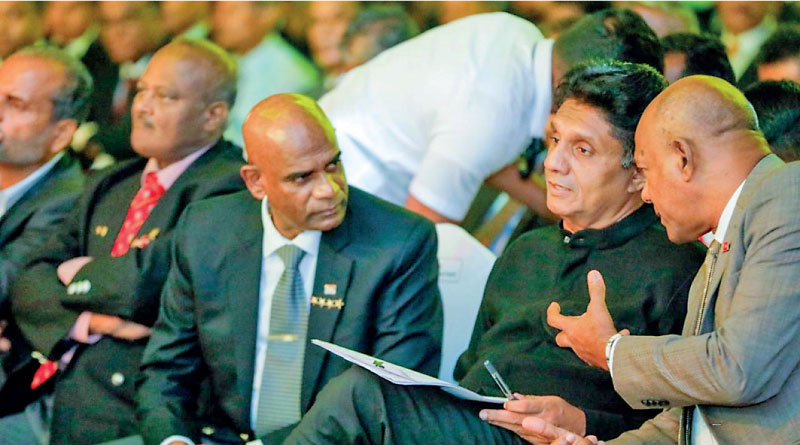
Ex-Army chiefs join Sajith
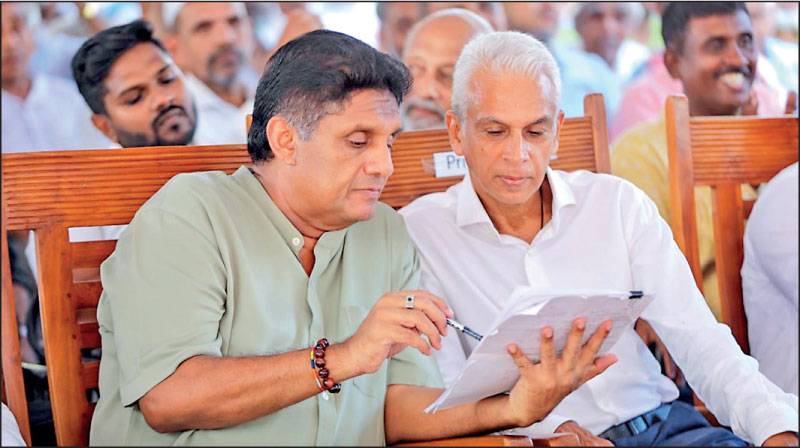
JR’s grandson leaves Ranil for Sajith
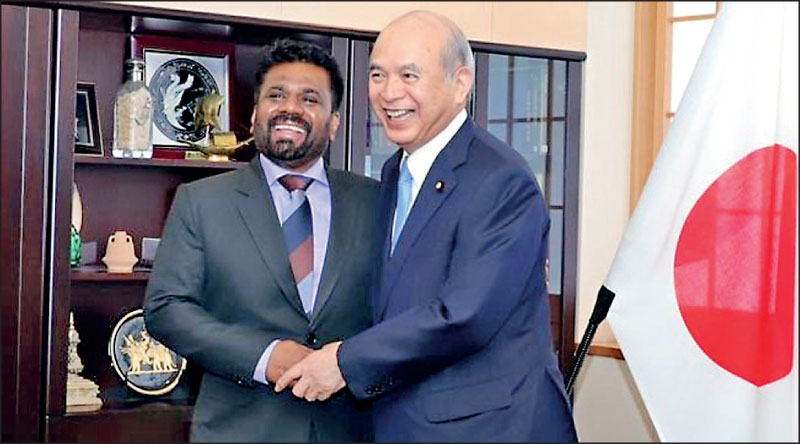
AKD with Japan’s State Minister for Foreign Affairs